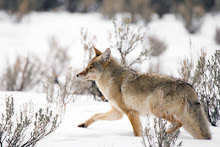In the February 24th, 2009 issue of the Idaho State Journal, the following article appeared in the forum section:
Is Coyote Hunt Sporting?
Coyotes prey on sheep and calves, which outrages Idaho ranchers, and they take down at least some deer and antelope, which ticks off hunters. So Idaho generally accepts the idea that coyotes are hardly predators which can be killed at any time with no hunting license required.
That being said, there is something disquieting about an organized slaughter of coyotes, which was being promoted by Greg Webster, proprieter of an outdoors store in Challis.
The Saturday event offered prizes such as rifle scopes to hunters with the biggest and smallest kills. About 20 hunters were expected to enter, with participants able to attract the coyotes using man-made calls or electronic calls, mimicking howls or animals in distress.
"Here is a business hosting a daylong slaughter that brings needless pain to wildlife," says Brian Ertz, president of the Wildlife Watchers branch in Idaho.
If Idaho wanted to reduce coyote numbers, it could establish bounties such as the system employed many years ago to encourage removing rodents. But killing animals to win a prize - what kind of sporting even is that?
To any avid hunter, this obviously was a bias opinion. We, at Predator's Addiction, felt it was only fair to respond, to shed light from another perspective. Following is our response:
After reading through the article, “Is coyote hunt sporting?,” we thought it would only be fair to give perspective from the opposite end of the spectrum.
As co-founders and partners of Predator Addiction, a group that, not only attends numerous Predator hunts throughout the state of Idaho and surrounding areas, but also manufactures handmade coyote calls, we believe it is fair to say that predator hunts, are more than just “an organized slaughter of coyotes.” Competing in these events almost weekly, we have yet to encounter any sportsmen who take advantage of the situation and turn it into a massacre.
The predator hunts are put together by avid hunters, and local community members. Although there is no limit, and no permit needed to hunt coyotes, all hunters entering these contests are required to have a hunting license. You also have to have a permit to use any type of artificial light, in which are used to hunt the coyotes. The event mentioned in the article, that took place in Challis, Idaho, and was promoted by Greg Webster, owner of Bent Rod Outdoor Store, was an event that had everything needed to make it a fair-chase hunt. Though it is legal to take down coyotes from a moving vehicle, regulations on these hunts, including the hunt put on by Webster, prohibit, and discourage the use of vehicles, snow machines, and airplanes. Instead, hunters use mouth calls, and, on occasion, electronic calls, to try and overcome predators’ keen senses.
Any hunter will tell you it’s a trick, and a huge part of the hunt, to call a coyote within shooting range. Coyotes are extremely wary and use their exceptional sense of smell to detect anything out of the ordinary. The hunters that are able to call well, can tip the odds in their favor. As reported in late 2008, in The Kansas City Star , a widely circulated paper in Kansas, predator hunting is the fastest growing hunting sport in the country. Coyotes, by nature, are predators. Being predators that they are, they often eliminate valuable livestock from many local farms and ranches.
Questioning the integrity of the predator hunt as a sport, by saying that it’s merely “killing animals to win a prize,” is degrading. Although these events do offer material prizes, that’s not the main attraction to attend these hunts. As in any other hunt, whether it be big game or waterfowl, there is always a prize. The sense of pride any sportsman gets when he attains his target, is a bigger prize than anything else he could receive.
Wednesday, February 25, 2009
Subscribe to:
Post Comments (Atom)

Thank you for your well informed response. It is greatly appreciated. I wish everyone could be as educated and informative when writing articles. The newspaper tends to print anything submitted whether the writers are correct or full of it. So thank you for clarifying a much needed hunt.
ReplyDelete